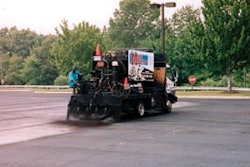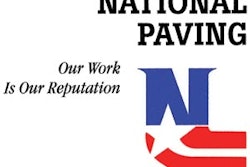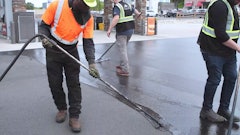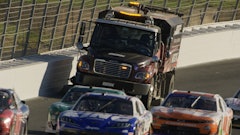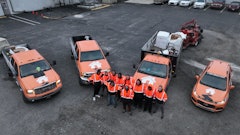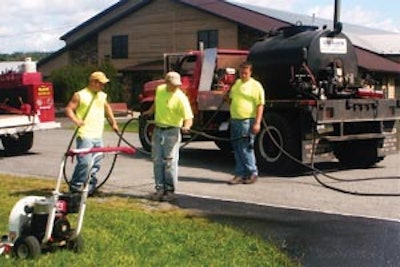
Last year Mifflintown, PA, contractor Mike Cleck took a chance. He quit his job as a paver operator to expand his weekend sealcoating business into a full-time paving operation. After a full season out on his own, Cleck says the change was successful.
“This year has gone very, very well. I don’t think it could have gone any better,” he says. “The crew worked together very well, the materials we worked with were high quality, the equipment worked out well, and the jobs we did turned out the way we wanted them to.
“The jobs we performed led us to new jobs. People saw our finished projects and saw our clean, professional looking equipment out on the jobsite, and we got a lot of jobs by word of mouth because of that.”
The venture was a financial accomplishment, too.
“I wasn’t really expecting a lot because it was my first year, but I did better than I had expected,” Cleck reports.
“I really like to pave”
Cleck got his first paving job in 1986, learning the industry from a Vietnam vet who was tough on Cleck but a great teacher. Since then, Cleck has worked as a laborer for other paving contractors. In 1994, Cleck started a weekend sealcoating business, working part-time sealcoating on the weekends and continuing full-time on a paving crew during the week.
A few years ago, changes at the paving company Cleck worked for prompted him to think about setting out on his own.
“I really like to pave,” Cleck says. “I like to sealcoat, too, but I’ve been paving for 18 years. Of all the jobs I’ve ever had, I like paving the best. Starting a paving company is something I’ve always wanted to do, but I didn’t always have the collateral and equity that a bank wanted. I was finally in the financial position to do it, and I decided that I would start a company on my own.”
When Cleck’s former co-workers found out he was starting up his own paving business, three of them asked Cleck if they could join the crew. Cleck was happy to bring on three experienced pavers he worked well with, but had one reservation.
“The people I hired weren’t just employees, they were my friends,” he says. “My biggest fear was whether I would have enough work for them.”
First season preparations
Before he laid his first mat as Mike Cleck Paving, Cleck had a lot of prep work. The first step was finding some equipment.
“Being around paving equipment and paving manufacturers for so many years, I had a good idea of what I wanted to buy and what I didn’t want to buy,” he says. “I couldn’t buy new pieces of equipment, but I knew I wanted a paver and a roller that were fairly new, because next to your employees, those are the two most important elements of a paving operation.”
Cleck purchased a 2002 LeeBoy 8500 paver, used but in good shape. He also found a 2003 Bomag 120 roller lease model with very low work hours on it, two Mustang skid steer loaders, a 1995 International triaxle dump truck, a 1987 Ford 9000 triaxle dump truck, a 1980 GMC single axle dump truck, and a 1972 Huber M600 motor grader. “For an older machine, it works great,” Cleck says.
After collecting his arsenal of paving equipment, Cleck painted up most of the pieces in company colors with name and contact information prominently displayed. He makes an effort to keep his machines clean on the job site for a professional operation, and stays on top of maintenance.
“If there’s something wrong with the equipment, we get it fixed right away. I want all my equipment to be safe to work with,” he says. “I’m a big believer in safety and maintenance. And maintenance also prolongs the life of your equipment.”
Cleck says the equipment out on jobs was a big advertising draw, but he also explored other marketing avenues.
“I spent a lot of money on advertising, but I had to get the word out because we were new,” he says.
Cleck put ads in all the local papers, advertised on restaurant placemats and menus, and bought spots on local radio stations. He also bought 10 yard signs that he planted in yards of friends and family who lived in high-traffic areas. A friend who lives across the street from a hospital allows Cleck to park his 1972 motor grader in his lawn.
Although Cleck doesn’t keep full records on where companies heard about him, he asks when he thinks of it and it seems equipment recognition was his number one advertising tool, with radio second.
The first season
Cleck Paving took in work in a five-county area, roughly a 200-mile radius around Mifflintown. With five mix suppliers in the area with similar mix offerings and prices, he used the supplier closest to the job he was working on.
Cleck’s paving operation was set up with his seven-man paving crew working both paving and prep operations. Instead of paving every day, they crew took a few days off from paving every week to do grading work.
Cleck worked with his team every day. He says being an owner out with the team has a positive effect on his workers — they know their boss is working hard, which makes them want to work hard, too.
“It means a lot when the owner is on the crew every day,” he says. “I think they might do a little better job, and might do a little extra work.”
Cleck’s paving market was split about 80% residential and 20% commercial. Cleck says he has no plans to change that.
“It doesn’t matter where the work comes from, as long as I’m paving. As long as I have work for my guys and I’m doing something I love to do, I’m happy,” he says.
Some of Cleck’s commercial jobs included banks, a funeral home, and a nursing home, where the crews spent every day for a week paving.
“All the residents would come and watch us. During breaks or downtime, we’d all go over and talk to them. They’d talk about their childhoods, where they grew up, and jobs they’d had over the years.”
While the paving operation continued during the week, Cleck and a couple of the paving crew members continued working weekends on sealcoating projects. They worked Saturdays, and Sundays if needed. Pennsylvania’s sealcoat season runs from May to October.
“I stop sealing around late October, once the nights get cold enough to slow the curing process,” he says.
Cleck uses a Sealmaster 550 gallon tank and sprayer, and he does all the spraying himself using a two-coat application. He uses a Sealmaster sealer with a latex additive and black sand for traction. About 50% of his sealcoating work comes through call backs, a rate Cleck attributes to his quality and customer service.
“If someone doesn’t need a driveway done, I’ll tell them that I think they can wait another year, and people respect that,” he says.
Tweaking for next season
Cleck has a few things on deck for next season. He plans on adding four new people to his team. Two will work full-time sealcoating during the week. The other two will do full-time grading work.
“This way we can pave every day, and won’t have to take time out to do the grading,” he says.
Mike says his equipment worked out well and will be using it all again next year except for the paver, which he is going to trade in for a new LeeBoy, either a 2005 or 2006.
“I want to update my paver to a new paver, one that’s under warranty. The paver I have works really well, but I want to try to keep working with a new paver every few years,” he says.
During the 2005 season, Cleck made every effort to keep his overhead down, which included passing on a secretary. Last year, Cleck’s wife, Penny, did the book work and paperwork, and each night she took down messages off the machine. Cleck says next year he plans to get a secretary to help out with the work.
One thing Cleck won’t be changing is his paving crew. Cleck says that his men were the key to his success his first year out on his own, and believes that success is in your crew and how well they know how to do their jobs.
“The thing that worked out the best was the crew,” he says. “The guys knew what to do on the jobs without being told, we worked well together, and a lot of people complimented us on the crew’s professionalism and quality.”



![Lee Boy Facility 2025 17 Use[16]](https://img.forconstructionpros.com/mindful/acbm/workspaces/default/uploads/2025/09/leeboy-facility-2025-17-use16.AbONDzEzbV.jpg?auto=format%2Ccompress&fit=crop&h=100&q=70&w=100)


